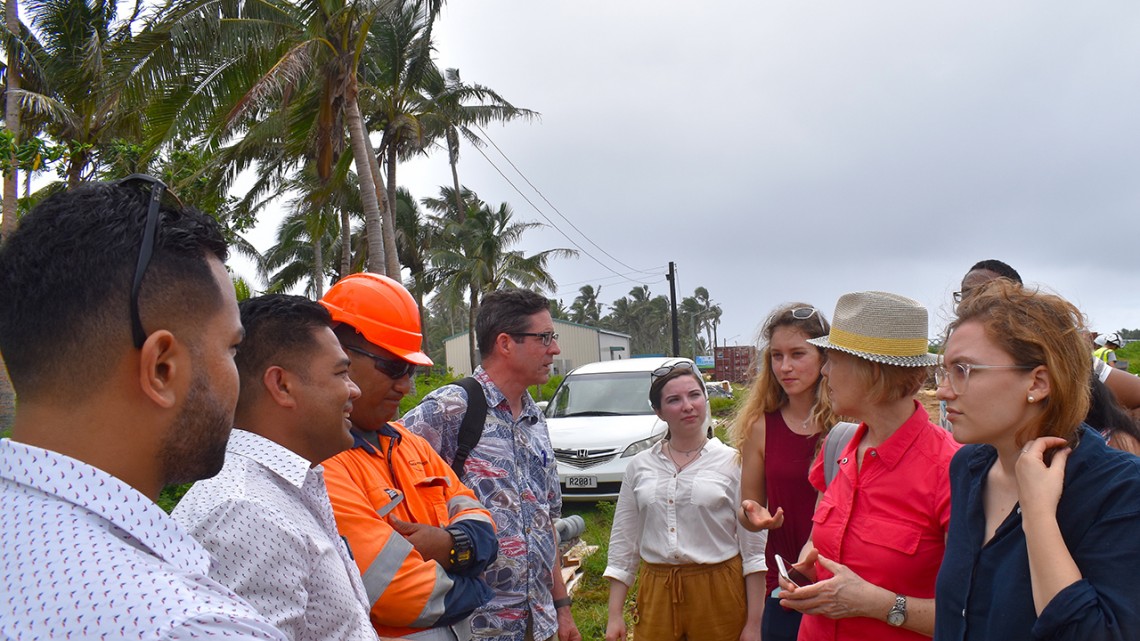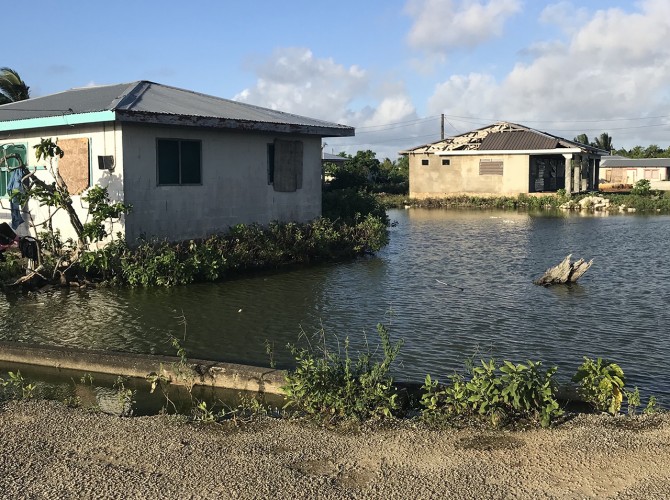
Tongan construction managers discuss climate change projects with Jerry Finin, from middle, Skye Hart, Hailey Morey, Gretchen Worth and Sara Trigoboff.
In warm South Pacific, students faced cold reality of climate change
By Blaine Friedlander
Ten Cornell undergraduate and graduate students traveled 23 hours and 7,600 miles to the South Pacific island nation of Tonga to see what climate change really looks like.
For more than a quarter-century, sea levels around the low-lying oceanic nation have risen about 6 millimeters annually, nearly double the global average, according to the United Nations Development Program. In the Kingdom of Tonga – an archipelago comprising four main islands groups inhabited by more than 100,000 residents – coastal erosion has carved off nearly 40 meters on some of the larger islands.
During the university’s spring break, March 30 to April 8, the students spoke with the nation’s leaders and residents to conduct field studies for a City and Regional Planning workshop course. The students will prepare a planning report with mitigation recommendations for the Kingdom of Tonga’s Office of Climate Change.
Tonga’s residents hope to stave off the effects of a warming world. “Understanding the complex challenges of planning for climate change is particularly urgent in island societies facing increasing vulnerabilities and, in many cases, fewer options for addressing the consequences of this existential threat,” said Gerard A. Finin MRP ’85, Ph.D. ’91, visiting lecturer in city and regional planning, who accompanied his students. “With new evidence indicating that ocean warming is occurring faster than previously thought, island societies are especially at risk.”
For this work, Cornell collaborated with University of the South Pacific’s Tonga campus. The trip was funded by the Department of City and Regional Planning.
Students saw that not only are sea levels encroaching on the land, but also Tonga’s picturesque sandy beaches have been mined for their sand for use in construction.
“This is not only ruining potential future tourism sites, but accelerating coastal erosion,” said Zeyu Hu ’19, M.Eng. ’19. “To mitigate these impacts, but not prohibit development, Tonga has begun actively dredging sand from offshore locations. But people are still stealing sand from beaches to build their homes. This just shows how hard it is to change behavior.”
The host family for Skye Hart ’18, MRP ’19, toured ‘Ahau on the island of Tongatapu. “My host’s father said that two decades ago, the shoreline was about 20 meters farther out. Now, there is water flooding the land on either side of the raised road and part of a foreshore [zone between high and low water marks] rock wall is visible a couple meters out in the ocean,” she said. “There are houses a few meters back from the water and mud, but they will likely be flooded by ongoing coastal erosion.”
Hailey Morey, MRP ’20, said that access to clean water is a high priority, but the capital’s main water system does not extend to local villages, explaining that freshwater is “either stored in expensive, personal water tanks or in plastic bottles, which then creates a plastic problem,” she said.
Getting to Tonga proved to be a feat. The Cornell students took a bus from Ithaca to John F. Kennedy International Airport in New York City, flew to Los Angeles and then to Fiji on an 11-hour flight. During a six-hour layover in Fiji, the students toured poor urban neighborhoods, wealthy districts and a farmers market in Lautoka, in the heart of Fiji’s sugar industry. The final leg from Fiji to Tongatapu was two hours.
“The group was undaunted by the distance,” Finin said.
The students saw firsthand that the most severe ramifications of global warming appear to be approaching sooner than originally thought, Finin said.
“It became clear through meetings with parliamentarians, government ministries, civil society groups and private sector representatives,” he said, “that there is insufficient planning in terms of adaptation and forward-thinking mitigation measures to prepare for the major problems that Pacific islanders are likely to experience in the years ahead.”
Media Contact
Get Cornell news delivered right to your inbox.
Subscribe

